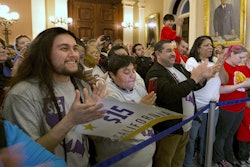HARRISBURG, Pa. (AP) — A look at where Pennsylvania's three Democratic candidates for U.S. Senate — John Fetterman, Joe Sestak and Katie McGinty — stand on a selection of issues, from abortion to trade. The primary election is April 26.
___
ABORTION
All three support abortion rights.
___
CAMPAIGN FINANCE
All three support greater limits on the influence of money in political campaigns and allowing Congress and states to limit the money raised and spent in election campaigns by outside groups, candidates and others, limits that the U.S. Supreme Court has weakened in recent years.
___
ENERGY AND ENVIRONMENT
All three support President Barack Obama's administration's new carbon pollution regulations on power plants, called the "Clean Power Plan," and its agreement to a United Nations accord on global warming in which countries pledge to limit the amount of greenhouse gases emitted by human activity in the coming decades.
___
GAY RIGHTS
All three support same-sex marriage and civil protection for lesbians, gays, bisexuals and transgender people.
___
GUN RIGHTS
All three would support requiring background checks for online gun sales and purchases at gun shows; a ban on the manufacture and sale of automatic firearms: a ban on allowing people on the terrorist watch list to obtain a firearm; increasing federal criminal penalties against people who make "straw purchases"; expanding gun-buying prohibitions to abusive dating partners and convicted stalkers; imposing a federal limit on magazine capacity; allowing federal funding for gun violence prevention research; granting broader authority to the federal government to release firearm trace data; requiring gun dealers to submit their inventories to law enforcement agencies; and repealing a federal law that shields gun manufacturers from liability in cases where their weapons are used in crimes.
McGinty also would support a ban on the sale of armor-piercing "cop killer" bullets.
All three oppose federal reciprocity legislation to require every state to recognize and allow the use of concealed carry licenses or permits issued by other states.
___
HEALTH CARE
All three support Obama's 2010 federal health care law, the Affordable Care Act, and Sestak voted for it as a member of the U.S. House. All three also voice support for "single payer" health care that excludes private health insurance companies. Sestak said he supports the "public option" concept that did not make it into the final version of the Affordable Care Act. Fetterman said single payer health care "is the ideal that we should all move towards." McGinty said single payer health care "would squeeze so much of the excessive costs out of our health care system."
___
IMMIGRATION
All three support the "DREAM Act," which would establish a path toward citizenship for people who came to the United States illegally as children and who attend college or join the military; a 2012 Obama administration policy of allowing young people in the country illegally who have no criminal history and graduated from high school or served in the military to remain in the county; a bipartisan immigration reform bill that passed the Senate in 2013 that would establish a path toward citizenship for an estimated 11 million immigrants living illegally in the United States; and Obama's executive order in 2014 to allow up to 5 million immigrants living in the U.S. illegally — mainly the parents of U.S. citizens and lawful permanent residents — to work legally in the United States.
___
MIDDLE EAST
All three oppose the use of ground troops in Syria. All three support the Obama administration's nuclear accord with Iran.
___
MINIMUM WAGE
All three support an increase in the federal minimum wage, currently set at $7.25 an hour. McGinty and Fetterman support an increase to $15 an hour. Sestak supports an increase to $10.60 an hour.
___
PRESIDENTIAL RACE
McGinty has endorsed Hillary Clinton in the Democratic Party's presidential nominating contest. Fetterman has endorsed Bernie Sanders, and Sestak is not endorsing a candidate.
___
SOCIAL SECURITY
All three oppose the diversion of Social Security payroll taxes into privately managed investment accounts.
___
SUPREME COURT
McGinty says she would support a nominee who understands that the Constitution guarantees abortion rights and the right to organize and collectively bargain; that "a clean environment, a safe environment is essential"; and that the Supreme Court's decision in Citizens United v. FEC "is some of the worst jurisprudence ever written."
Sestak says "while there's no single litmus test," a nominee he supports must understand that same-sex marriage "is the right approach; voting rights is absolutely something that needs work," and abortion rights are "absolutely critical." He says diversity and camaraderie on the court is also important.
Fetterman says he's for a litmus test and would support a nominee who agrees that the Citizens United decision is "the single greatest threat to our democracy," supports abortion rights, understands that the right to organize "has to be enshrined as an ideal" and will uphold proactive climate change legislation.
___
TRADE
All three oppose the Trans-Pacific Partnership free trade agreement with 11 Pacific Rim nations that Obama's U.S. trade representative signed in February and that is awaiting congressional approval.
___
Marc Levy covers politics and government for The Associated Press in Pennsylvania. He can be reached at [email protected]. Follow him on Twitter at www.twitter.com/timelywriter. His work can be found at http://bigstory.ap.org/author/marc-levy .
___
This story has been corrected to show Sestak's updated position on a minimum wage increase to $10.60 per hour, not $10.12 per hour.






















